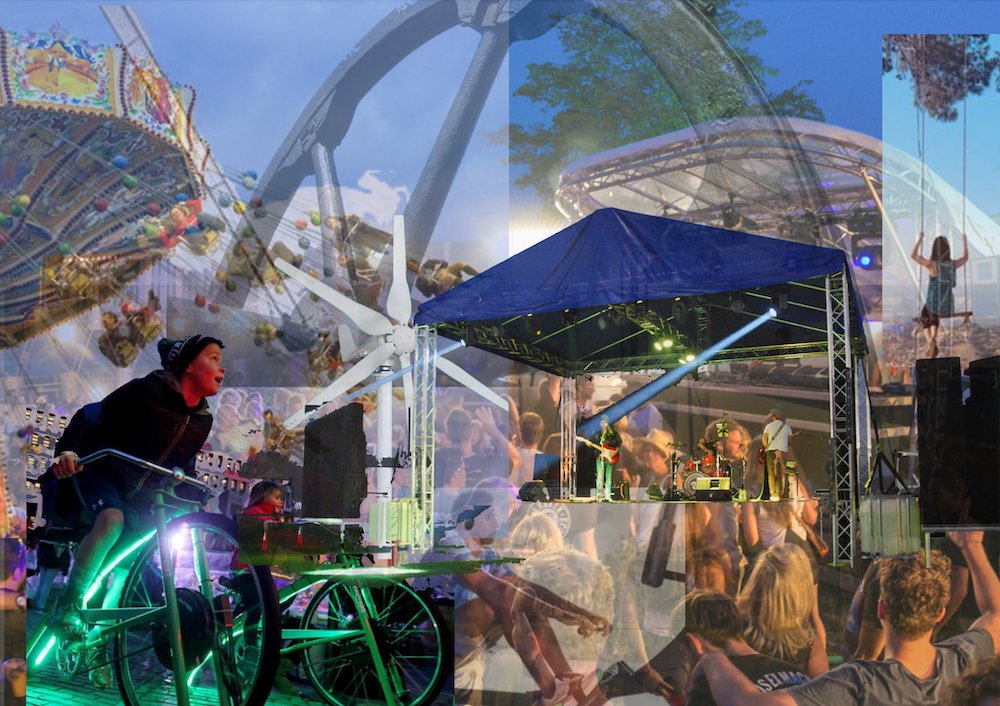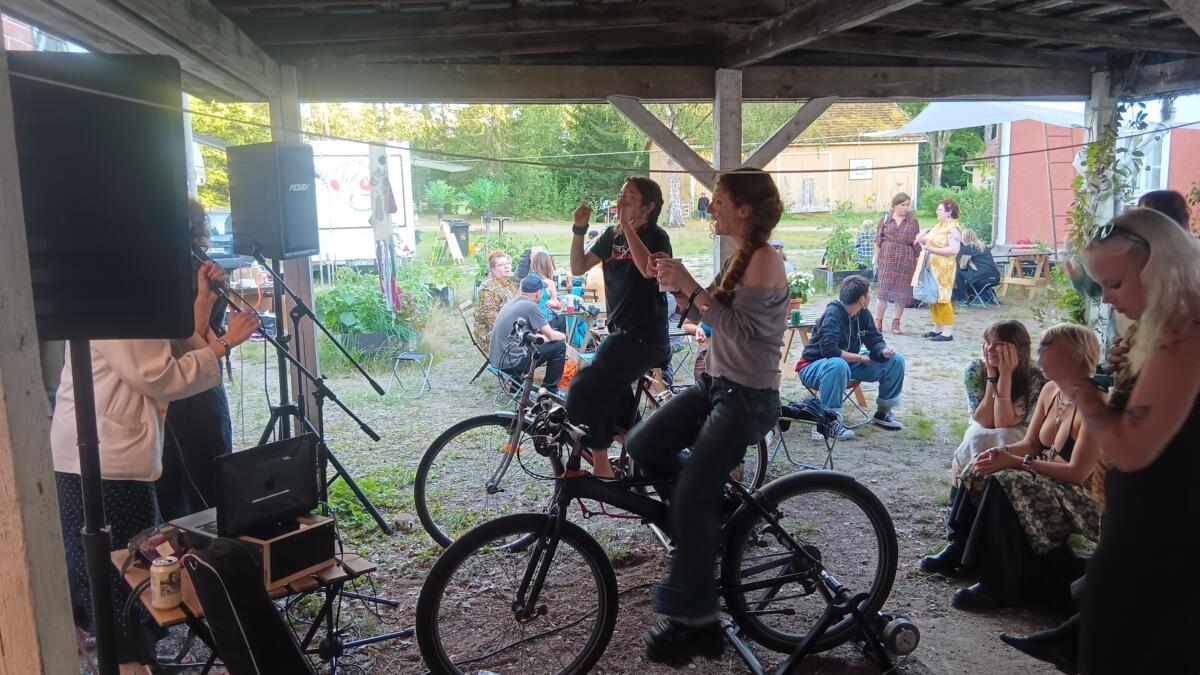GaiaStage — machines are socio-material arrangements
An activist music research project that uses a zero-carbon performance stage for music and other performances.

Introduction
GaiaStage is a zero-carbon performance stage for music and other performances. Its power source is pedal power, provided by the participating audience that is encouraged to travel to the site by bicycle. The members of the audience dock their bikes to generator stations and by pedaling their bikes they provide the electric energy for the off-grid infrastructure: audio amplification, the light show, and other electrical appliances. The performers need to motivate the volunteers who pedal to provide enough electrical power to sustain the performance.
Watch a short video of GaiaStage in action at the Norpas 2024 festival’s “Zero Carbon Karaoke”.
Zero-carbon platform for climate and technology
GaiaStage is an activist music research project. Its main aim is to provide evidence that the conscious reconceptualisation of technologies as socio-material arrangements bears the potential for positive change. Socio-material arrangement, the term American anthropologist Lucy Suchman suggested as an alternative word for machine, draws attention to the fact that no technology is solely material but a performed (material) practice [1].
The zero carbon footprint GaiaStage also provides a platform for performers and activists to address climate change without adding to the problem in the process. GaiaStage’s main objective is to educate and facilitate through enabling: GaiaStage demonstrates that we constitute our future through our technologies; that technologies are not the deterministic givens we have to adapt to, but material practices we can choose or refuse to perform.
Reconceptualizing technology for social change
A stage is not the materials it is built of, but the performative situation an artistic practice takes place in. Wherever GaiaStage sets up a stall, it provides a meeting point, an activist Agora, a participatory platform for performers and audience to engage on the subject of energy and its transformation from kinetic, to electric, to kinaesthetic form as an artistic challenge. In practical terms, this means setting up a small sound-system that can be powered from two generator stations for standard bicycles.
What does GaiaStage mean?
The “Gaia” in GaiaStage refers to Bruno Latour’s reading of James Lovelock’s Gaia Hypotheses [2] whereby our technical actions make or break the potentially resilient balance between all contributing actants on our planet [3]. These technical actions are the socio-material arrangements [1] this project is interested in. In his previous work, postdoctoral researcher Dominik Schlienger brings these concepts together and hypothesizes that socio-material interactions are either appropriate or inappropriate appropriations [4], technical interactions that are subject to ethical negotiations.

References
[1] Suchman, Lucy and Suchman, Lucy A. (2007) Human-Machine Reconfigurations: Plans and Situated Actions, ser. Learning in Doing: Social, Cognitive and Computational Perspectives. Cambridge University Press.
[2] Jame E. Lovelock, (1995) The Ages of Gaia: A Biography of Our Living Earth, ser. A Commonwealth Fund book. Oxford University Press.
[3] Latour, Bruno. (2005) Reassembling the Social: An Introduction to Actor-Network-Theory. Clarendon Lectures in Management Studies. OUP Oxford.
[4] Schlienger, Dominik. (2022) Developing ALPS: Notes on agency in technology. Helsinki, Sibelius Academy.
Contact information for the project
-
Dominik Schlienger
- Postdoctoral Researcher, Tutkimusinstituutti, Research Institute
Part-time teacher, Music technology, Sibelius Academy - dominik.schlienger@uniarts.fi
Introduction
GaiaStage is a zero-carbon performance stage for music and other performances. Its power source is pedal power, provided by the participating audience that is encouraged to travel to the site by bicycle. The members of the audience dock their bikes to generator stations and by pedaling their bikes they provide the electric energy for the off-grid infrastructure: audio amplification, the light show, and other electrical appliances. The performers need to motivate the volunteers who pedal to provide enough electrical power to sustain the performance.
Watch a short video of GaiaStage in action at the Norpas 2024 festival’s “Zero Carbon Karaoke”.
Zero-carbon platform for climate and technology
GaiaStage is an activist music research project. Its main aim is to provide evidence that the conscious reconceptualisation of technologies as socio-material arrangements bears the potential for positive change. Socio-material arrangement, the term American anthropologist Lucy Suchman suggested as an alternative word for machine, draws attention to the fact that no technology is solely material but a performed (material) practice [1].
The zero carbon footprint GaiaStage also provides a platform for performers and activists to address climate change without adding to the problem in the process. GaiaStage’s main objective is to educate and facilitate through enabling: GaiaStage demonstrates that we constitute our future through our technologies; that technologies are not the deterministic givens we have to adapt to, but material practices we can choose or refuse to perform.
Reconceptualizing technology for social change
A stage is not the materials it is built of, but the performative situation an artistic practice takes place in. Wherever GaiaStage sets up a stall, it provides a meeting point, an activist Agora, a participatory platform for performers and audience to engage on the subject of energy and its transformation from kinetic, to electric, to kinaesthetic form as an artistic challenge. In practical terms, this means setting up a small sound-system that can be powered from two generator stations for standard bicycles.
What does GaiaStage mean?
The “Gaia” in GaiaStage refers to Bruno Latour’s reading of James Lovelock’s Gaia Hypotheses [2] whereby our technical actions make or break the potentially resilient balance between all contributing actants on our planet [3]. These technical actions are the socio-material arrangements [1] this project is interested in. In his previous work, postdoctoral researcher Dominik Schlienger brings these concepts together and hypothesizes that socio-material interactions are either appropriate or inappropriate appropriations [4], technical interactions that are subject to ethical negotiations.

References
[1] Suchman, Lucy and Suchman, Lucy A. (2007) Human-Machine Reconfigurations: Plans and Situated Actions, ser. Learning in Doing: Social, Cognitive and Computational Perspectives. Cambridge University Press.
[2] Jame E. Lovelock, (1995) The Ages of Gaia: A Biography of Our Living Earth, ser. A Commonwealth Fund book. Oxford University Press.
[3] Latour, Bruno. (2005) Reassembling the Social: An Introduction to Actor-Network-Theory. Clarendon Lectures in Management Studies. OUP Oxford.
[4] Schlienger, Dominik. (2022) Developing ALPS: Notes on agency in technology. Helsinki, Sibelius Academy.
Contact information for the project
-
Dominik Schlienger
- Postdoctoral Researcher, Tutkimusinstituutti, Research Institute
Part-time teacher, Music technology, Sibelius Academy - dominik.schlienger@uniarts.fi